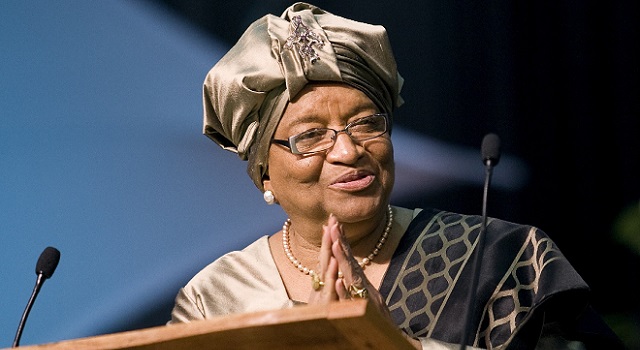
Sirleaf, 78, will not run in October 10’s presidential election after a constitutionally mandated two terms.
In 2005, she unexpectedly swept the country’s first vote after a brutal civil war, and during her time in office the fragile peace has held.
But “Ma Ellen”, as she is known at home, is the first to admit her tenure has failed to deliver meaningful representation for women in Liberian political life.
“We haven’t worked hard enough for parity,” she said in a recent CNN interview.
“It saddens me, because I represented breaking the glass ceiling in Africa.”
Just a tenth of Liberia’s 30 senators and only a sixth of candidates standing in next Tuesday’s elections, which are for the presidency, vice presidency and House of Representatives, are women. Those figures have barely budged since 2005.
Meanwhile levels of teenage pregnancy and sexual violence against girls remain extremely high and less than half of women can read or write.
“Irrespective of how many women win or lose, women have got to stay in the race and women have got to stay on the political landscape,” said MacDella Cooper, a former model turned humanitarian.
She is the sole female presidential candidate, running against 19 men.
Cooper, like several female candidates contacted by AFP, admires Sirleaf’s grit but says the nation needs a different kind of leader who can broaden prosperity as well as keep peace.
“Fifteen percent of our country’s citizens are living so well but the rest are left to fight for themselves,” she said.
– ‘Anti-feminist’? –
Two Liberian feminists have caused a stir by asserting in international media that Sirleaf has “failed” women in the political realm, potentially tarring her legacy.
“I think President Sirleaf is anti-feminist when it comes to politics,” Robtel Neajai Pailey, who co-authored a widely shared article with activist Korto Reeves Williams, told AFP.
She accuses Sirleaf of indifference to a call by Liberia’s Women’s Legislative Caucus for women to occupy 30 percent of political party leadership positions in 2010.
Pailey believes women fall behind in gaining affiliation with larger political parties and often lack their own funding, unlike some of this year’s millionaire male candidates.
 The Independent Uganda: You get the Truth we Pay the Price
The Independent Uganda: You get the Truth we Pay the Price





